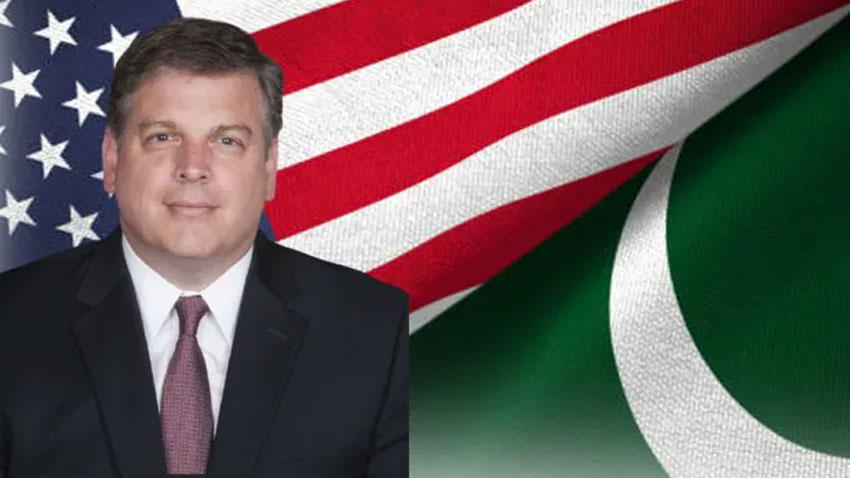Ambassador Blome praised Pakistan’s efforts in counter-terrorism and emphasized the US’s commitment to supporting Pakistan across various domains, including addressing regional threats, fostering economic collaboration, advancing renewable energy, managing climate issues, and enhancing education.
He highlighted that the US-Pakistan partnership extends beyond security, with substantial investments in health, trade, and development sectors.
“To put it simply, we recognize Pakistan’s vast potential. As one of the world’s most populous countries with a vibrant and growing young population, I am continually impressed by their ambitions, ideas, and dedication to a better future for their nation. These aspirations represent significant economic opportunities in climate, technology, manufacturing, trade, and security—areas that promise growth and development not just for Pakistan, but for the entire region and the world. We are committed to helping Pakistan and its people realize these possibilities,” he said.
At the same time, he emphasized, “We cannot overlook our collaboration in addressing threats to regional and global peace and security. We acknowledge the sacrifices made by Pakistanis in the fight against terrorism and remain committed to supporting your efforts to counter these threats. A stable and secure Pakistan is crucial for broader regional stability, and we are dedicated to advancing this shared goal.”
The envoy noted that while security issues have often been seen as central to the US-Pakistan relationship, they should not be the only defining aspect of it. He highlighted that in recent years, the United States and Pakistan have faced significant challenges together, including floods, a pandemic, and economic difficulties. Those working to strengthen this relationship recognize that it has always been part of a longer journey toward increased prosperity and security for both nations, with each step in various fields being important.
He affirmed the United States’ commitment to the success and flourishing of this partnership, stating, “We have invested significantly in it over the years, and I’d like to highlight how we have done that.”
Ambassador Blome emphasized the economic partnership as a cornerstone of the US-Pakistan relationship. “Our economic ties are evident in our trade relations. The United States is Pakistan’s largest export market, and last year, bilateral trade exceeded $9 billion, showcasing the robust economic relationship we share. Notably, Pakistan has a trade surplus of about $3 billion with the United States,” he mentioned.
He added that the private sector has recognized Pakistan’s potential and has contributed to its growth and prosperity. American businesses have played a significant role in Pakistan, employing and training Pakistanis, who then establish and run their own global firms. These companies have created nearly 100,000 jobs, driven critical research and development, and supported local communities.
The US supports Pakistan’s efforts with the International Monetary Fund (IMF) to develop a sustainable budget and fiscal approach, noting recent progress. “Pakistan needs to focus on generating economic growth, which will come from harnessing the creativity and energy of its private sector,” he said. The US has also been a major contributor to Pakistan’s development, including support for infrastructure projects like the Mangla, Tarbela, Gomal Zam, Satpara, and Golen Gol hydroelectric dams. These projects provide clean, affordable energy, prevent water shortages, and mitigate flooding impacts. The upgrade of Mangla’s turbines, a 100-year investment, exemplifies this commitment.
In addition to over $215 million in flood recovery and relief, the US is investing in clean energy, water, and agriculture to better position Pakistan for the future.
Ambassador Mariam Madiha Aftab, Additional Secretary (Americas), Ministry of Foreign Affairs, highlighted the dynamic and multifaceted nature of the US-Pakistan relationship, including health, trade, defense, and energy security. She emphasized the importance of economic collaboration, security cooperation, educational exchanges, and climate change initiatives, and stressed the need for a peaceful resolution to the Jammu & Kashmir dispute in line with UN Security Council resolutions and the will of the Kashmiri people.
Ambassador Mansoor Khan, Director of the Beaconhouse Center for Policy Research (BCPR), underscored the multifaceted nature of Pakistan-US relations, including political, security, defense, and economic ties. He announced a new undergraduate course on Pakistan-US relations at BNU.
Dr. Neelum Nigar, Director of the Centre for Strategic Perspectives at ISSI, acknowledged the US’s significant contributions to Pakistan’s development in education, healthcare, and climate change. She stressed the importance of mutual respect and cooperation to address contemporary challenges and opportunities.
Ambassador Sohail Mahmood, Director General of ISSI, provided an overview of the evolving Pakistan-US relationship, noting a shift from security to trade, investment, energy, and people-to-people exchanges. He highlighted the cyclical nature of bilateral relations, influenced by external factors and regional developments, and called for greater attention to Pakistan’s historical role and potential in the emerging global order. He also emphasized the need for the US to consider Pakistan’s interests, particularly in relation to the impact of the US-India strategic partnership and US-China competition.




